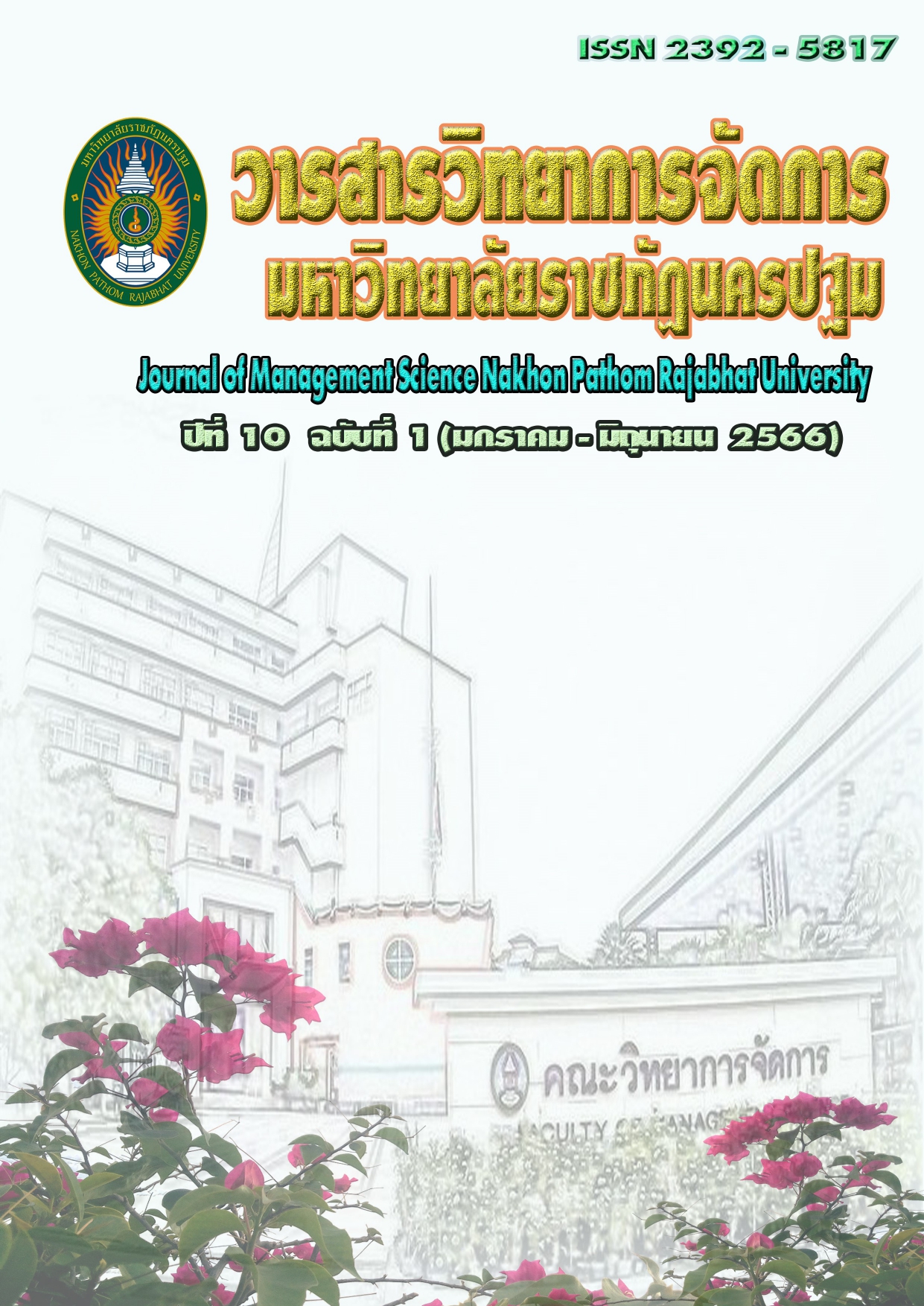Employee Engagement of Sub-District Administrative Organizations In Thailand
Main Article Content
Abstract
The purpose of this dissertation is to study: 1. The relationship between transformational leadership, quality of work life and aachievement culture organizational with employee engagement of sub-district administrative organizations. 2. Comparison of the dedication of sub-district administrative organizations classified by size of sub-district administrative organizations. This research was a quantitative research by using a questionnaire. The population is 3,182 employees of sub-district administrative organizations. And the sample size was determined by Taro Yamane's formula at the confidence level of 90%, the sample group was 285 people. Accidental random sampling collected data for 400 people, the researcher therefore used a group of 400 people. Statistics used to analyze the data were percentage, mean, standard deviation, Correlation Analysis, Multiple regression analysis and t-test.
Findings showed that 1) Transformational leadership and achievement culture organizational positive direct relationships with employee engagement at the statistically significant level of .01. 2) The size of sub-district administrative organizations that are different will cause the staff's dedication in knowledge and thinking with emotional commitment there is a difference. The medium-sized sub-district administrative organization will have a dedication in knowledge and thinking with more emotional dedication than large sub-district administrative organizations. But there was no difference in employee engagement medium and large sub-district administrative organizations.
Policy recommendations: expanding knowledge of organizational behavior that correlates with the dedication of employees and executives of sub-district administrative organizations apply research results to develop employees to be dedicated to their work to achieve the highest efficiency and effectiveness for Sub-district Administrative Organizations in Thailand.
Article history: Received 2 March 2023
Revised 8 May 2023
Accepted 13 May 2023
SIMILARITY INDEX = 4.13 %
Article Details

This work is licensed under a Creative Commons Attribution-NonCommercial-NoDerivatives 4.0 International License.
The views and opinions of the article appearing in this journal are those of the author. It is not considered a view and responsibility of the editorial staff.
References
กณิกนันต์ แสงมหาชัย. (2561). การจัดการทรัพยากรมนุษย์ในยุคดิจิตอล. การบริหารงานภาครัฐในมิติต่าง ๆ ของไทย. นนทบุรี: นราธิป พริ้นติ้ง.
กุลธิดา กรมเวช. (2558). ความมุ่งมั่นทุ่มเทในการทางานของพนักงาน: ปัจจัยที่เกี่ยวข้องและการพัฒนา. วารสารการพัฒนาทรัพยากรมนุษย์และองค์การ, 7(2), 87-103.
เกศกุล สระกวี และ อรพินทร์ ชูชม. (2560). ผลกระทบทางสังคมของโครงการพัฒนาการท่องเที่ยวโดยชุมชน ที่ดำเนินงานโดยองค์การบริหารการพัฒนาพื้นที่พิเศษเพื่อการท่องเที่ยวอย่างยั่งยืน (องค์การมหาชน). วิทยาลัยพัฒนศาสตร์ ป๋วย อึ๊งภากรณ์ มหาวิทยาลัยธรรมศาสตร์.
โกวิทย์ พวงงาม. (2560). ประวัติและความเป็นมาขององค์การบริหารส่วนตำบล. ค้นเมื่อ 23 มีนาคม 2563 จาก http://wiki.kpi.ac.th/index.php?title= ประวัติและความเป็นมาของ องค์การบริหารส่วนตำบล
ณัฐธิดา ชูเจริญพิพัฒน์. (2555). วัฒนธรรมองค์การที่มีผลต่อการปฏิบัติงานของพนักงานธนาคารไทยพาณิชย์ เขตนครสวรรค์. ปริญญาบริหารธุรกิจมหาบัณฑิต, การจัดการทั่วไป. มหาวิทยาลัยเทคโนโลยีราชมงคลธัญบุรี.
นันทนพ เข็มเพชร และพบสุข ช่ำชอง. (2561). แรงจูงใจในการทำงานของพนักงานสาย สนับสนุนในกลุ่ม Generation Y: กรณีศึกษามหาวิทยาลัยมหาสารคาม. วารสารการ เมืองการปกครอง, 8(1), 37-38.
พรชัย ลิขิตธรรมโรจน์. (2551). พฤติกรรมองค์การ. กรุงเทพฯ : สำนักพิมพ์โอเดียนสโตร์.
พิชญาภา วงศ์หมัดทอง. (2563). ภาวะผู้นำการเปลี่ยนแปลงที่ส่งผลกระทบต่อความมุ่งมั่นทุ่มเทในการทำงาน กรณีศึกษาบุคลากรโรงพยาบาลสงขลา. รัฐประศาสนศาสตรมหาบัณฑิต สาขาวิชารัฐประศาสนศาสตร์, มหาวิทยาลัยสงขลานครินทร์.
พิสิษฐ์ บุญถนอม. (2564). แนวทางการดำเนินงาน เพื่อความสำเร็จในการทำงานร่วมกัน ระหว่างผู้นำชุมชนกับองค์กรปกครอง ส่วนท้องถิ่น กรณีศึกษา : องค์การบริหารส่วนตำบลบางสะแก อำเภอบางคนที จังหวัดสมุทรสงคราม. วารสารการวิจัยและพัฒนา มหาวิทยาลัยสวนสุนันทา, 13(2), 249-266.
วิชาญ ฤทธิธรรม และวีรศักดิ์บำรุงตา. (2564). องค์การบริหารส่วนตำบล : บริบททั่วไป, สภาพปัญหาและแนวคิดที่ควรปฏิรูป. วารสารมหาจุฬานาครทรรศน์, 8(5), 1-16.
Bass, B.M. and Avolio, B. J. (1994). Transformational leadership development, Pola Alto, California: Consulting Psychologists.
Bass,B.M. and Avolio, B. J. (2008). Improving Organization Effectiveness Through Transformational Leadership. Thousand Oak: Sage.
Bass, B. M., Avolio, B. J., Jung, D. I., and Berson, Y. (2003). Predicting unit performance by assessing transformational and transactional leadership. Journal of Applied Psychology, 88(2), 207–218.
Bencsik, H. A., and Juhász, T. (2010). Family friendly concepts and tools in different-sized Hungarian organizations based on empirical study. Problems and perspectives in management, 8(1), 70–79.
Farooqui, S., and Nagendrab, A. (2014). The impact of Person organization Fit on Job Satisfaction and Performance of the Employees. Procedia Economics and Finance, 122-129.
Gordon, J. R., Mondy R. W., Sharplin, A., and Premeaux, S. R. (1990). Management and organizational behavior. Massachusetts: Allyn and Bacon.
Huse and Cummings.(1985). Organization Development and Change. (3rd ed.). Minnesota: West Publishing.
MacDermid, S. M., Williams, M., Marks, S., and Heilbrun, G. (1994). Is small beautiful? Work-family tension, work conditions, and organizational size. Family Relations, 43(2), 159–167
Sathe, V. (1985). Culture and relate corporate realities. Homewood, IL : Richard D. Irwin.
Shuck, B., Adelson, J. L., and Reio Jr, T. G. (2017). The employee engagement scale: Initial evidence for construct validity and implications for theory and practice. Human Resource Management, 56(6), 953-977.
Taylor and Woodhams. (2016). Human resource management: People and organizations. Kogan Page Publishers.
Treppawan, P. (2021). Strategic human resource management. Bangkok: Se-Education Public Company Limited.
Walton. R.E. (1974). “Improving the Quality of Work Life”. Harvard Business review. 4(7): 12-14.
Yamane, T. (1976). Statistics: An introductory analysis. (2nd ed.). New York: Harper and Row.
Yusuf, B. Gokmen, D. Fahriye, A. and Zehra, A. (2020). School principals’ performance and its relationship with teachers’ organizational citizenship behavior. Rev. Cercet. Interv. So. 69, 293–312
Zigarmi. D, Houson.D, Witt,D. and Diehl, J. (2011). Employee Work Passion. Perspective Employee Work Passion Volume 3. Retrieved January 21, 2021 from https://www.academia.edu/14211334/Employee_Work_Passion


